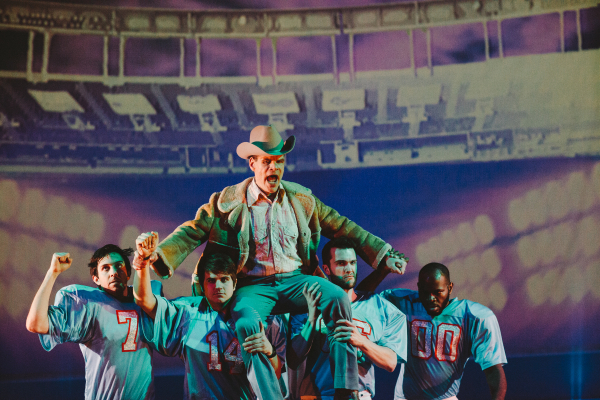Bum Phillips All-American Opera
The late coach of the Houston Oilers comes out singing in this operatic tribute from composer Peter Stopschinski and Monk Parrots.

(© Corey Torpie)
A chorus of football fans and big-shouldered players sing "Luv ya blue" in a complex chord during the first-act finale of Peter Stopschinski's Bum Phillips All-American Opera, now making its world premiere in a production by Monk Parrots at La Mama's Ellen Stewart Theatre. For a brief moment, the adrenaline-fueled fervor of professional sports merges with the dizzying passion of opera, creating perfect harmony. Unfortunately, moments like this are few and far between in this valiant effort that never quite reaches a boiling point.
Football isn't an obvious subject for opera, nor is Bum Phillips the most glorious example of Texas football-coaching. Indeed, Tom Landry led the Dallas Cowboys to five NFC titles and two Super Bowl victories during his 29-year tenure as coach. Try though he did, Phillips never made it to the Super Bowl in the six seasons he coached the Houston Oilers. That disappointment provides the basis for Stopschinski's opera. (Tragic figures make much better operatic heroes anyway.) And considering the amount of psychic energy annually expended by millions of fans on this sport that has been known to make grown men cry, perhaps football is the perfect subject for an "all-American opera."
The show traces Bum's life from his childhood in rural Texas through his service in World War II and then gets right into the meat and potatoes: 1975-1980, when Bum (Gary Ramsey) was hired by Houston Oilers owner Bud Adams (an appropriately slimy John Smiley). Bum is portrayed as an innovator, not just in his choice of players like Earl Campbell (an über-macho Anlami Shaw), but in his personal style. His trademark aviator glasses and ten-gallon hats (splendidly re-created by costume designer Alison Heryer) become iconic in Houston. His energy and charisma help whip up a level of team spirit rarely seen outside of high school pep rallies in the American South and Midwest. Sadly, it is all for naught, as we see Bum's Super Bowl dreams crushed under the wheels of fate and questionable refereeing.
Ramsey has a sturdy voice and gruff demeanor, the outer layers to the big softie we come to know. Alison Bolshoi is excellent as Bum's second wife, Debbie, singing an aria about Bum's retirement that is as refreshing as the glass of sweet tea she downs at the close of the song. Unfortunately, her appearance comes at the very end, almost as an afterthought. There is practically no mention of Bum's first wife, Helen, about whom Bum sings, "Some things oughta stay between a man and a woman."
Maintaining this propriety, the final portion of the show addresses the coach's relationship with Jesus Christ (Morgan Hooper, playing a model-handsome messiah with a winning smile) and his ministry to the prison population. Phillips made regular visits to Texas prisons with former Oiler Mike Barber (Patrick Mulryan). A song that is simultaneously interpreted in American Sign Language subtly hints at Camp Heart Sign, a summer camp for deaf children that is still supported through Bum Phillips Charities. You get the sense that he was a really nice guy.
Such glowing tributes to genuinely good people don't make for particularly thrilling opera. Large portions of this show feel more like a self-serving memoir than an opera. Even the football scenes, which should capture the nail-biting heat and intensity of athletic competition only ever achieve a lukewarm feeling. Director Luke Leonard's inventive staging impressively squeezes 100 yards into the Ellen Stewart Theatre. John Harmon deserves the distinction of MVP for portraying literally every other football player against whom the Oilers competed. Still, this resourceful stagecraft is not enough to salvage a mostly ho-hum theatrical experience.
People who had a connection to Phillips, either as a fan or friend, will undoubtedly be moved by this two-hour-fifteen-minute homage. Everyone else will be left checking their watches.









